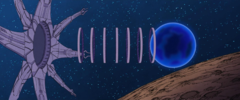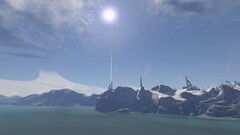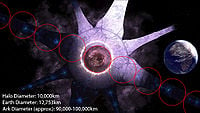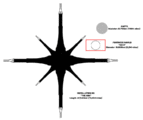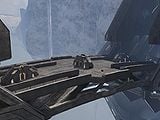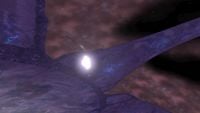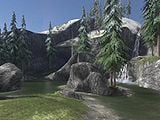Installation 00
From Halopedia, the Halo wiki
| Installation 00 | |
|---|---|
| File:ARK.jpg | |
| General overview | |
|
Description: |
Disk with a hollow core and eight curved arms |
|
Location: |
Intergalactic space, over the galactic plane, 262,144 light years from galactic center |
| Operation overview | |
|
Function: |
Conservation facility, Lifeworker research station, Halo construction foundry and remote activation facility |
|
Attached AI(s): |
|
|
Date of construction: |
|
| Structural information | |
|
Diameter: |
127,530 kilometres (79,243 mi)[1] |
|
Gravity: |
1G[1] |
|
Surface temperature: |
-30°C to 50°C (-22°F to 122F°)[1] |
|
Atmospheric composition: |
|
- Miranda Keyes: "Where would someone go to activate the other rings?"
- 343 Guilty Spark: "...Why, the Ark, of course."
- — 343 Guilty Spark to Commander Miranda Keyes
Installation 00, also known as the Ark and sometimes translated as Waypoint,[2] was a Forerunner installation from which the entirety of the Halo Array could be activated simultaneously.[3] Installation 00 also functioned as a safe haven from the Halo network's strategic pulse, and as a facility to construct replacement Halos. The Ark was situated outside the galaxy, about 218 (262,144) light years from the galactic center. In comparison, Earth is 25,000 light years from the galactic center.[4]
Although later universally known as "the Ark", Installation 00 was originally one of two installations identified as Arks, the other being the older greater Ark. Due to this, Installation 00 was also referred to as the lesser Ark to differentiate it from the much larger greater Ark, whose foundry produced the original array of rings 30,000 kilometers in diameter, as opposed to the 10,000 kilometer-wide foundry of Installation 00.[5]
Overview
The Ark was designed with a number of functions, one of which was to remotely activate the seven Halo rings from outside the array's blast radius. Installation 00 could be placed on standby mode via a fail-safe system that was activated by an aborted firing such as the one that occurred at the end of the Battle of Installation 05. In addition to serving as the firing control center for the Halo array, Installation 00 functioned as an automated factory to construct Halo installations, thereby ensuring that the Halo Array was always ready to fire.[6][7] While originally designed solely as a construction and control center for the Halos, due to the Librarian's influence, the Ark was given a secondary function as a safe haven for life in the galaxy in the case of a galaxy-wide activation of the Halos; this is also the source of the name "the Ark".[8]
Knowing that the Array would defeat the Flood through sterilizing the galaxy of any neurologically complex life, the Forerunners planned to preserve all life by storing it in the Arks and other preservation facilities. In this final resort plan, known as the Conservation Measure, the Librarian was to index every sentient species in the ecumene and bring specimens of each to the Ark. These last sentient species would be stored on the Ark and would later reseeded on their original homeworlds after the Halo Array had been activated.[9]
History
Forerunner-Flood war
- "Every vessel we can fill, we send to the Ark. I dare not cease the mission. Not now, not until I've done all I can. Each one of these souls is finite and precious. And I'm close. Close to saving them all."
- — A message from the Librarian to the IsoDidact
Like the rest of the newer, more efficient Halo Array, Installation 00 was constructed sometime between 101,000 BCE and 100,000 BCE under orders of Master Builder Faber, to address problems with the greater Ark and its larger Halos. While plans for the second Ark had existed for some time, its construction was delayed by the Old Council to avoid the Builders from gaining too much power.[10] The lesser Ark, as it was known at the time, was designed to produce smaller but much more powerful Halo rings, which could be transported more efficiently and could deal far more widespread damage. Until the very last days of the Forerunner-Flood war, the lesser Ark, its new Halos, and its location were kept a well-guarded secret; only the most top-tier Forerunners knew of its existence, and the only one who knew the exact coordinates of the installation was Faber. Whereas the greater Ark acted as the Forerunners' final line of defense and command center, the lesser Ark would serve the function of a last fallback point where its own array of rings could be swiftly distributed to their designated locations across the galaxy and fired to cleanse the galaxy of all sentient life as a last resort.[11]
In the endgame of the Forerunners' war with the Flood, the Forerunner Contender-class artificial intelligence Mendicant Bias, which had been corrupted by the Gravemind and defected to the Flood, attacked and destroyed the greater Ark, killing the majority of the remaining Forerunners who had taken refuge there. Using coordinates provided by the Master Builder, a handful of survivors, including the IsoDidact, managed to escape to the lesser Ark where they prepared their weapons of last resort. In order to buy the IsoDidact time, the Librarian traveled to Earth, broadcasting a feint transmission intended to draw the Flood's attention to her. She spent her last days in the plains near Mount Kilimanjaro, near the site of the slipspace portal to Installation 00. Mendicant Bias knew of the secret Ark and how to access it through the Keyships, though he did not know of its exact location. In order to devise the best possible defense against Mendicant Bias, the Forerunners deployed Offensive Bias, a military AI formerly in control of the greater Ark and Mendicant's replacement, and sent it to counter Mendicant Bias' fleet in advance before it could reach the Ark. While Offensive Bias engaged Mendicant's fleet, the IsoDidact completed preparations for the Halo Array and fired the rings from the Ark, purging the galaxy of all life.
Following the Array's firing, Offensive Bias defeated Mendicant Bias within minutes. Offensive decided to spare the last portion of its opponent and delivered it to Installation 00 for study. There, the remaining Forerunners, led by the IsoDidact, held a trial for the AI for betraying the ecumene. The Didact decided to keep Mendicant alive as it had intimate knowledge of the Flood and could be called upon in case of their return. Bias was entombed in the installation with only one thought allowed to him: atonement.[12]
Battle of Installation 00
- Main article: Battle of Installation 00
Immediately following the Prophet of Regret's botched invasion of Earth on October 20, 2552, the Prophet of Truth dispatched a Jiralhanae-led fleet to continue the assault and to uncover what he believed to be the Ark. By November 17, the Covenant had uncovered the structure they had spent the last month unearthing. Truth, though his Forerunner Dreadnought, activated the device, which was actually just a portal generating structure which led to Installation 00.
Truth led his fleet through the portal; after defeating a Flood invasion of the town of Voi, a joint United Nations Space Command - Sangheili strike force followed the Prophet's forces.[13] Upon their arrival on December 11,[14] the latter force were attacked by the Covenant, which held a 3:1 numerical advantage.[4] Despite this, the Sangheili Fleet of Retribution crushed Truth's forces.
After engaging the Covenant across the installation, Spartan John-117 and Arbiter Thel 'Vadam entered the citadel, where they found Truth, who had been infected by the Flood. Soon after 'Vadam killed the Prophet, effectively destroying the Covenant and ending the war, he, the Spartan, and 343 Guilty Spark, the former monitor of Installation 04, discovered that a replacement Installation 04 was being constructed by the Ark's foundry.[6] The Spartan and the Arbiter soon rescued the AI Cortana, who held Installation 04's activation index, from the Flood-infested Covenant capital city, High Charity.[15] They, with Sergeant Major Avery Johnson, assaulted the Halo's control room to activate the ring, destroying both the Flood and the remaining Covenant forces. They succeeded, though Johnson was killed by the monitor. While Guilty Spark refused to allow his new Halo to be destroyed, he also implied that he was protecting the Ark. The partially constructed installation's activation tore the ring apart and severely damaged the Ark.[7][16][17]
Post-battle
In March 2553, the Office of Naval Intelligence deployed an automated probe-carrying spacecraft to the Ark using advanced slipspace technology. The ship arrived in November and dispersed its probes, although all communications with the devices were cut off after initial transmissions confirming the Ark's survival. In response, the Template:UNSCship was sent from Luna in December 2553 to conduct a more thorough investigation of the installation's ravaged surface.[18] Due to the damage dealt to the Ark's life support systems and its artificial sun, heavily inclement weather became the norm.[19]
The Rubicon carried several remote contact teams, who landed on the Ark and attempted to find the source of the mysterious signal. After about eight days, contact with all teams was lost; only one team, RCT-06, returned, having sustained heavy casualties and carrying with them a device of unknown nature. The armature's origin was subjected to debate, but it was believed by the team to be the source of the beacon picked up by the initial investigative group.[19] The device, actually a broken, barely active monitor, began to relate its past life as a human: Chakas. Though the ship's ONI attaché initially doubted the veracity of the monitor's account, the science team leader pointed out that it was consistent with the "Bornstellar Relation" found on Onyx.
Eventually, the monitor revealed that it was no other than 343 Guilty Spark himself. Claiming that he knew the location of the Librarian, whom he believed to be alive, Spark subsumed the ship's AI, knocked out the crew via the life support systems, and hijacked the ship.[20] Communications with the Rubicon halted within 48 hours of their last report. Search and rescue teams were then deployed to the site, but reported no findings.[19]
The last of its ground team, Bobby Kodiak, was left stranded when the Rubicon left, and mortally wounded by attacking chaefka. It was then that he was contacted by the Ark's monitor, 000 Tragic Solitude, who had survived the Ark's devastation and sought to repair the station and get revenge. Offering him a chance to live, Tragic Solitude rescued Kodiak and mended his body with cybernetics, turning him into a cyborg and putting him under the monitor's control. For the following two years, Solitude then repaired the Ark and prepared for an attack on the galaxy.[21]
Operation: FAR STORM
- Main article: Operation: FAR STORM
In 2555, the Ark was partially restored and Tragic Solitude enacted its plan. Using Kodiak to activate the Array, Tragic Solitude initiated a countdown to the rings' firing in several weeks. This was so that someone within the Milky Way galaxy would open a portal to the Ark in an attempt to stop the countdown, allowing the monitor to dispatch its Retriever Sentinels to kill all sentient species and mine their planets to repair the Ark. The countdown was discovered on the intact Halo rings soon after and a human-Sangheili joint task force departed to the Ark through the Portal at Voi. The expedition's ship was intercepted and brought down above the Ark by Tragic Solitude's Retrievers, but the crew managed to reach the Array's control center and stop the countdown. However, the portal was still open and Tragic Solitude deployed a fleet of Retrievers to Earth in an attempt to mine the Sol system's worlds, causing heavy damage to the region surrounding the portal as well as the UNSC Home Fleet. However, the UNSC-Sangheili crew managed to thwart the monitor's plan and the Retrievers were recalled, with the monitor ending up destroyed. UNSC reinforcements were deployed through the portal to the Ark soon after and rescued the expeditionary crew. With Solitude killed, the Retrievers became dormant, allowing humans to establish research facilities on the Ark and study the Sentinels in hopes that they could be commanded to continue repairing the Installation.[21]
Design details
Installation 00 resembled a massive flattened dish with a series of eight curved arms, four large and four small, arranged around its rim, similar to the petals of a flower. The entire upper surface was terraformed, with oceans, forests and deserts.[4][6] Installation 00 was 127,530 kilometres (79,243 mi) in diameter and thus one of the largest known Forerunner constructs.[1]
At the center of the installation was the Foundry, an enormous circular facility used to construct Halos. The core of the 10,000-kilometer-wide Foundry was a hollow space, home to a stripped remnant of a material-rich celestial body used to obtain the vast amounts of resources required for the construction of a Halo ring. The Foundry generated so much heat that the Ark required multiple cooling stations. At least two such systems spanned a snowy gorge; it is possible that the massive cooling systems caused this icy climate.[22]
Like the shield worlds, Installation 00 possessed an artificial sun.[4][6][7]
Like the Halos, Installation 00 featured a Cartographer facility, a map room that could pinpoint any location on the installation.[4] Similarly to the Halos, the Ark featured a control room from which the array could be activated. This citadel was protected by a system of energy shield barriers that circled the center of the disk. These barriers were controlled by towers that circumscribed the center of the installation.[6]
Defenses
Similar to most Forerunner installations, the Ark had its own monitor, 000 Tragic Solitude, charged with the facility's defenses. For the most part, Solitude reacted little when humanity and the Covenant arrived at the Ark, thought when 343 Guilty Spark attempted to access the Ark's systems during the Battle of Installation 00, Tragic Solitude threatened to add the monitor to the facility's targeting ledger if he persisted.[23] After the Ark was severely damaged by the destruction of Installation 04B, the latest on a line of destroyed Forerunner relics, Solitude grew bitter and viewed all sentients in the galaxy as incapable of being peaceful.[21]
The Ark's small defenses were Aggressor Sentinels created by numerous Sentinel factories just like at the rings. The Retriever Sentinels could also be used offensively, though they were not usually outfitted with weapons until Solitude began arming them. The Ark was also guarded by armigers, humanoid defense droids that were capable of attacking with energy rifles and staves. Tragic Solitude could also take control of the Ark's wildlife and even people through manipulating their brain waves.[21]
Environment
The Ark had a habitable surface on each of its spokes and on the majority of the inner circle, apart from the foundry. This terrain was intended to support cataloged life forms prior to being reseeded throughout the galaxy.[24] These landscapes and biomes were as diverse as those of Earth and of the Halos, consisting of deserts,[4] taiga,[6] and deciduous forests.[25] Several bodies of water occur across the installation. As such, the Ark can sustain its own ecosystem, providing a variety of habitation for many kinds of life.
Like most Forerunner constructs, the Ark's atmosphere is similar to that of Earth, being mostly comprised of oxygen and nitrogen. This means that all known sentient species, with the exception of the Unggoy, can survive on the surface without any form of protection. As with the Halos, Installation 00 features a widely varying range of climates.
As the Ark was located outside the galaxy, isolated in a black void of space, there were no nearby natural sources of light to power the installation and facilitate the survival of biological organisms on its surface. To counter this problem, the Ark was equipped with an artificial structure consisting of a bright, sun-like light, with several metal arms jutting from its center. The light source "scanned" over certain areas to generate day/night cycles, further contributing to the growth of vegetation and controlling weather patterns.[26]
The activation of Installation 04B inflicted substantial damage to the Ark. While some life support units remain intermittently active, they were in severe disrepair. Combined with the artificial sun's weakened output, weather conditions on the surface have became highly volatile. Most indigenous fauna have perished, either from the Halo pulse itself or the extreme weather that came afterwards.[19]
Slipspace portals
A major aspect of Installation 00 was its ability to send and receive objects via slipspace portals. During the Battle of the Capital, the Forerunners attempted to evacuate the seven Halos which remained under their control to Installation 00, though only one escaped.[27] Later in the Forerunner-Flood war, the rebuilt Halo array was dispersed throughout the galaxy through the use of these portals.[28] In order to ensure the safety of humanity, the Forerunners established a portal-generating structure near Mount Kilimanjaro on the human homeworld of Erde-Tyrene. During the Human-Covenant War on November 17, 2552, the Covenant forces under the command of the Prophet of Truth utilized this portal, sparking the Battle of Installation 00.[13][4] The portal was used again in 2555 by Tragic Solitude, though he could not activate its doorway to Earth from the Ark's end.[21]
Trivia

|
Browse more images in this article's gallery page. |
Production notes
- The Ark was known as "Waypoint" during the production of Halo 3.[29][30] This name was later rendered canonical by the Halo Waypoint forum administrator Catalog (posing as the Forerunner entity of the same name).[2]
- In early conceptual stages, artist Paul Russel did not want to make the Ark significantly larger than a Halo ring. One of his early concepts of the Ark design incorporated a cradle for a Halo installation in the center, with four sleek arms one one side of the ring, along with several beams leading to a central hub structure situated on the other side.[31]
- In Origins, the Ark and the Halos are depicted without land on their surfaces during the activation of the Halo Array. This is likely due to Cortana's interpretation, or an instance of artistic license, as both Halo: Silentium and the terminals in Halo: Combat Evolved Anniversary show that the Ark and the Halos had fully terraformed surfaces prior to the activation of the Array.
References
- The history and name of the Ark are a reference to the Biblical story of Noah, who was instructed by God to build an Ark to save specimens of every animal on Earth from a great flood. The name may also be a reference to Ark of the Covenant, which, according to the Jewish Torah and the Biblical Old Testament, contains the stone tablets of the ten commandments. It is the holiest object of the Jewish faith.
- The Ark has some similarity to the concept of an Alderson disk. However, an Alderson disk is much larger and has a star in the center.
Gallery
- ArkWarthogConcept.jpg
Early concept art of the Ark's temperate jungles for Halo 3.
A holographic representation of the Ark.
List of appearances
- Halo: First Strike
- Petra (Mentioned only)
- Halo 2 Template:First mentioned
- Halo Graphic Novel
- Second Sunrise Over New Mombasa (Mentioned only)
- Iris (Mentioned only)
- Halo 3 (First appearance)
- Halo: Legends
- Halo: Cryptum
- Halo: Combat Evolved Anniversary
- Halo: Primordium
- Halo: The Thursday War (Mentioned only)
- Halo 4 (Mentioned only)
- Halo: Silentium
- Halo: Rebirth
- Halo: Broken Circle (Mentioned only)
- Halo 2: Anniversary (Mentioned only)
- Terminals (Hologram only)
- Halo: New Blood (Mentioned only)
- Halo: Spartan Strike (Mentioned only)
- Halo: Hunters in the Dark
- Halo 5: Guardians (Mentioned only)
- Halo Online
Note
- ^ The original Halo Array was created after the extreme faction of Builders won their political battle with the Prometheans and the Didact was forced into exile, in approximately 101,000 BCE. Installation 00 and its newer array of six rings was created some time after the first Ark, placing its time of construction sometime in the millennium before the firing of the Halos.
Sources
- ^ a b c d e Halo: The Essential Visual Guide, page 14
- ^ a b Halo Waypoint: Query: Catalog (old), Halo Waypoint: Catalog Interaction
- ^ Halo 2, campaign level The Great Journey
- ^ a b c d e f g Halo 3, campaign level The Ark
- ^ Halo: Primordium, pages 343, 344
- ^ a b c d e f Halo 3, campaign level The Covenant
- ^ a b c Halo 3, Halo
- ^ Halo: Cryptum, page 274
- ^ a b Halo 3, Terminals
- ^ Halo: Silentium, page 45
- ^ Halo: Silentium, String 33
- ^ Halo Waypoint - The Trial of Mendicant Bias
- ^ a b Halo 3, campaign level Floodgate
- ^ Halo Waypoint, Hero-Fortitude
- ^ Halo 3, campaign level Cortana
- ^ Halo Waypoint: The Halo Array
- ^ Halo Waypoint: The Brutes
- ^ Halo: Hunters in the Dark, Chapter 2
- ^ a b c d Eleventh Hour reports, part 4
- ^ Halo: Primordium, pages 377-379
- ^ a b c d e Halo: Hunters in the Dark
- ^ Halo 3 level Narrows: "Without cooling systems such as these, excess heat from the Ark's forges would render the construct uninhabitable."
- ^ Halo 3, Terminal 3
- ^ Halo: Cryptum, page 334-336
- ^ Halo 3, level Isolation
- ^ Bungie.net: What IS this thing?!
- ^ Halo: Cryptum, page ???
- ^ Halo Legends: Origins
- ^ Isaac Hannaford: rapid environment work 2-6 hours a piece
- ^ halo.bungie.org: Re: Halo Concept Art
- ^ Picasa: Paul Russel > Halo 3: The Lost City 16/16
